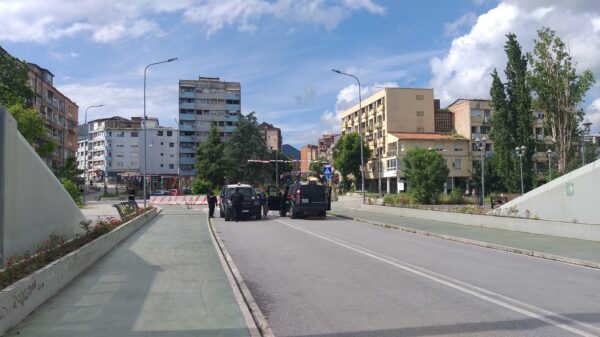Italy considers the Western Balkans a national and European interest. The newly elected Italian government led by Prime Minister, Giorgia Meloni, has shown a firm willingness to engage with the Western Balkan region.
At the margins of the Tirana Summit on 6 December 2022, PM Meloni stated that Rome wants to engage with the Western Balkans. The following month, she reiterated this commitment at the National Conference in Trieste titled “Italy and the Western Balkans: Growth and Integration.”
Previous Italian governments did not show an interest in dealing with Western Balkans affairs; however, the Trieste Conference represents a turning point in the Italian foreign policy in the region.
This could be seen as a fundamental step Italy could take to further develop the power of its economic diplomacy from.
Italian companies are already present in the region, particularly in Kosovo. Rome is Pristina’s second partner after Germany in terms of imports and exports and trade between the two sides has recorded an appreciable expansion in recent years.
As reported by Italian Ambassador to Kosovo, Antonello De Riu, the country is pro-Western and Italy’s presence in Kosovo is growing with franchising contracts such as Conad, Coincasa and Pizzeria Da Michele.
Among the six Western Balkan countries, Kosovo exercises a particular appeal for Italian investors. The reasons are multifold: geographical proximity, use of the Euro currency, a favorable investment climate and labor advantages, among others.
Potential for Italian firms
Kosovo enjoys free access to the European market under the EU Autonomous Trade Preference (ATP) regime and is very close to Italy. Furthermore, using the Euro eliminates conversion costs between currencies and reduces inflation and interest rates.
In addition, the country has favorable legislation in place, providing legal rights and protections for foreign investors and fair treatment. Finally, Kosovo has a low-labor cost and the youngest population in Europe.
Thus, there is economic potential for Italian firms in four key sectors: electricity, mining, construction, and textile.
Kosovo does not generate enough electricity to meet its national demand. Also, the country does not have hydroelectric (with some small hydroelectric plants built in recent years) and gas extraction. In addition, its usage of renewable sources (e.g., solar, wind) is minimal, with some exceptions; the Bajgora wind farm (102.6 MW) is the largest one.
Rome has, therefore, the potential to channel its investment capacity in terms of know-how, technology, and expertise there too.
Existing mines in Kosovo need rehabilitation and the mineral processing industry should be further developed. Italy could help in this regard. Concretely, it could offer its considerable technical expertise, including ad hoc training for local workers in the field. Italy has a long tradition of mineral extraction. Notably, industrial minerals requiring high-quality workmanship are essential inputs for most manufacturing and construction industries.
Rome could provide its significant know-how and experience in helping establish and follow up permanent and environmental protection systems connected to the mining sector.
The construction and infrastructure industry has expanded, too, contributing significantly to the country’s economic growth.
Italy has signed a contract entrusting G.F.G. Generale Costruzioni Ferroviarie to restore and modernize a strategic section of the country’s main railway line: 68 km of tracks from Pristina to the border with North Macedonia.
The same company has also won the contract for the second lot of rehabilitation works of the 35 km railway line from Fushë Kosovë to Mitrovicë. The further planned lot is 42 km up to the border with Serbia.
The textile sector has good potential for growth but is still not competitive in terms of technologies and production processes. Italy could help with technology and equipment and its made in Italy technical know-how.
Challenges for Italian firms
Despite Kosovo’s potential many hurdles exist. The country has a considerable trade deficit, including Italy. Besides that, in recent years, its political instability has created economic risks, shortcomings in the rule of law, and fortified the presence of organized crime.
In addition, the regulatory framework is sometimes contradictory and incomplete, generating legal uncertainty. Furthermore, the country is heavily reliant on remittances and development aid.
Besides that, the insecurity of land ownership rights following the 1999 conflict creates additional reservations for investors. The mix between the rules of the old Yugoslav legal system and the new standards of European law introduced in some areas does not help foreign companies to invest money in the country.
There is also low productivity among local businesses, often unable to bear the cost of exporting their products. A consistent shadow economy constitutes a significant portion of the country’s GDP, and the rate of tax evasion is high.
Taking advantage of opportunities
Italy should take advantage of the opportunities offered to invest in Kosovo. Establishing an Italy-Kosovo structured plan on foreign investments, involving both the Italian executive and experts in the field along with their local counterparts, could be considered a strategic roadmap to follow for the next decade.
Moreover, Italy might envisage high-level meetings to discuss the opportunities to invest, where to invest, the progress achieved and the challenges ahead.
A digital platform on such a structured plan could be published on the website of the Italian Embassy in Pristina and the Kosovo Government, where all information, discussions, future projects, and meetings could be uploaded. This action will signal transparency, accountability and commitment. Such a move inevitably requires political will and firm engagement from both sides.
The Trieste Conference might begin a promising Italian economic diplomacy in Kosovo. Its implementation will require synergy and targeted actions. The way ahead is bumpy, but it is worth moving on decisively for Rome’s and Pristina’s joint interests.
























































